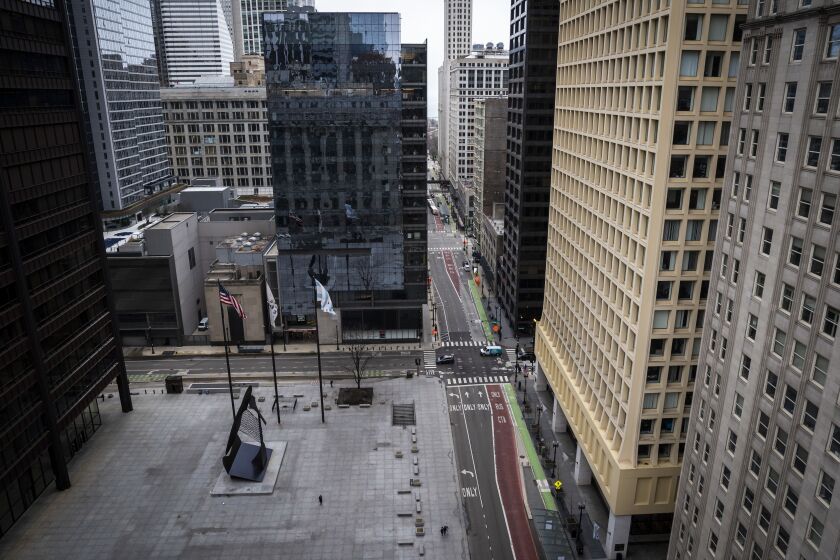Top mayoral aides said Monday they’re more hopeful than ever that pandemic-ravaged Chicago will receive replacement revenue from Washington, now that Joe Biden has defeated President Donald Trump.
Chief Financial Officer Jennie Huang Bennett and Budget Director Susie Park said they have no idea when Congress will ride to the rescue, how much money Chicago stands to receive or what strings might be attached to a second stimulus package.
But both women told the City Club of Chicago they believe Biden’s victory makes it more likely that Chicago will receive another windfall of federal funding to replace a healthy chunk of the $886 million in revenues lost to the coronavirus this year and the projected, $783 million in losses next year.
“We’re very hopeful for additional federal funding. … With President Biden, it will be more likely that we see increased pressure for funding for states and municipalities,” Bennett said.
The impact of federal funds can’t be overstated, the CFO said.
A city analysis assumed that any new round of federal relief would be similar to the CARES Act earlier this year. In that scenario, total city revenues were $440 million higher over the course of the recovery, which for now is expected to take two to three years, according to the city’s Department of Finance.
“So it’s very important, not just in terms of the finances and how we balance this budget, but the long-term trajectory of how painful it is for Chicagoans,” Bennett said.
“This is the time for the federal government to be providing that stimulus to lessen the pain of … a once-in-a-century pandemic and economic recession.”
Park agreed the “feeling is hopeful” since Biden claimed victory over Trump four days after the polls closed.
“There is uncertainty. We don’t know what form it’s going to take, the timing of it, the size of it. But there is hope. … We’ve had lots of conversations about what could potentially this look like when it comes or if it comes,” Park said.
“I can’t underscore [enough] the importance of how critical this funding is to us for the city’s finances, for our economic recovery and for a variety of other services our residents depend on.”
If the feds do ride to the rescue, Mayor Lori Lightfoot has said she would look first to reduce the $1.7 billion refinancing of general obligation and sales tax securitization bonds.
Bennett agreed.
“On the debt financing side, we are gonna see what happens as it relates to the federal landscape before making decisions on executing that refinancing,” the CFO said.
During the question-and-answer session, Bennett was asked how the city might suffer from the defeat of the constitutional amendment that would have authorized the graduated income tax championed by Gov. J. B. Pritzker.
Instead of answering directly, Bennett made a strong pitch for an increase in the local distributive share of funding to municipalities that determines the city’s cut of state sales tax revenues.
“It’s a revenue source that has significantly declined over the years — from as high as 10% to now just under 6%,” Bennett said.
“As we’ve seen the percentage that localities receive decline, that has created pressure on our finances and ultimately resulted in us having to go to other measures.”
Bennett said she looks forward to working toward a “comprehensive” solution that “not only supports the state’s financials, but also that of localities and that we make our way through this crisis together.”
To help wipe out a $1.2 billion shortfall caused primarily by the coronavirus, Chicago taxpayers are being asked to absorb a $94 million property tax increase followed by annual increases tied to inflation.
Lightfoot’s $12.8 billion pandemic budget also raises taxes on gasoline, computer leases and cloud services. It includes furlough days for non-union employees, 350 layoffs for unionized employees and the massive debt restructuring and refinancing that critics have branded “scoop-and-toss on steroids.”
On Monday, Bennett argued yet again that the $94 million property tax increase is “moderate, given the significant financial challenges” that Chicago faced “even before COVID.” It’ll “only” cost the owner of a home valued at $250,000 an extra $56-a-year.
Even with the increase, Chicago has the “lowest tax rate in Cook County, far lower than the 7.9 percent” that city taxpayers faced in 2001, Bennett said.
Annual Chicago property tax bills now range from $2,445 to $5,981. That’s a relative bargain compared to the $5,814 in the southern suburbs and $7,537 in the northern suburbs, she said.





